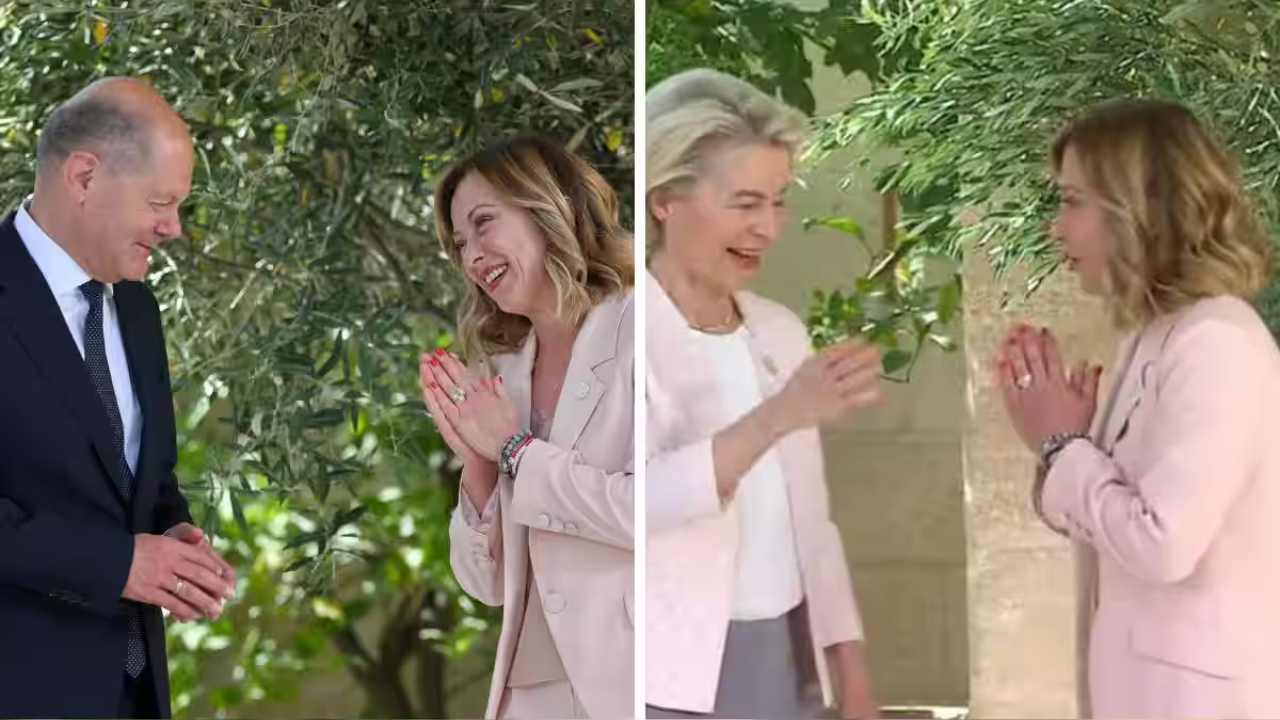In an unexpected yet culturally rich gesture, Italian Prime Minister Giorgia Meloni opted to greet fellow world leaders with the traditional Indian ‘Namaste’ at the G7 Summit held in the luxurious Borgo Egnazia resort in Italy’s Apulia region. This unique choice of greeting has sparked curiosity and admiration, highlighting the summit’s underlying themes of unity, respect, and cultural exchange.
Why Is Meloni Greeting With ‘Namaste’?
With the ongoing global crises, from the war in Ukraine to conflicts in the Middle East, the gesture was a poignant reminder of the need for a united front. “In times of division, a simple gesture of respect can serve as a powerful reminder of our shared humanity,” Meloni stated during an informal conversation with the press. By greeting European Commission President Ursula von der Leyen and German Chancellor Olaf Scholz with ‘Namaste,’ Meloni set a tone of inclusivity and mutual respect right from the start.
Origin And Significance Of ‘Namaste’ ?
The ‘Namaste’ greeting, which involves pressing the palms together with a slight bow, is deeply rooted in Indian tradition, symbolizing respect and the recognition of the divine within each individual. By choosing this greeting, Prime Minister Meloni not only paid homage to Indian culture but also underscored the importance of mutual respect and recognition among the world’s leaders. It was a symbolic act, meant to bridge cultural divides and foster a sense of solidarity as the leaders gathered to address pressing global issues.
Namaste Diplomacy: How Italy Is Strengthening Ties With India?
The ‘Namaste’ greeting also took on an additional layer of significance with the arrival of Indian Prime Minister Narendra Modi at the summit. Fresh from his re-election for a third term, Prime Minister Modi’s presence at the G7 Summit was notable. Meloni’s choice of greeting was seen as a respectful nod to her esteemed counterpart, reinforcing the strong bilateral ties between Italy and India.
“Prime Minister Meloni’s visits to India last year have been instrumental in deepening our bilateral agenda,” Modi remarked. The exchange of ‘Namaste’ between the two leaders further solidified their commitment to bolstering the strategic partnership between their nations, particularly in regions such as the Indo-Pacific and the Mediterranean.
What Is The Agenda Of The 50th G7 Summit?
The G7 Summit, presided over by Italy, has an ambitious agenda this year. Leaders are set to tackle economic growth, environmental concerns, and international security, with a significant focus on the war in Ukraine and the conflict in Gaza. Italy’s presidency has emphasized defending the rules-based international system, which has been undermined by Russia’s actions in Ukraine. The inclusive approach of inviting leaders from developing countries across Africa, South America, and the Indo-Pacific region further illustrates the summit’s commitment to global dialogue and cooperation.
Meloni’s use of ‘Namaste’ is a prime example of cultural diplomacy. In a summit where the focus is often on economic and security issues, this small yet significant gesture reminded the world of the power of cultural respect and understanding. By embracing a greeting from a different culture, Meloni demonstrated Italy’s openness to diverse perspectives and its commitment to fostering a global community based on respect and collaboration.









